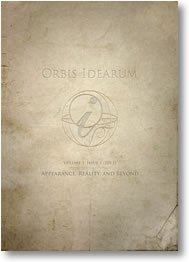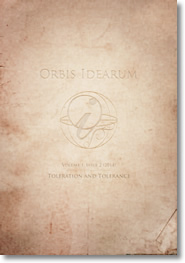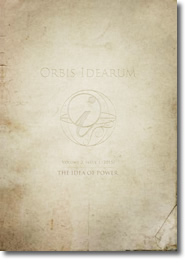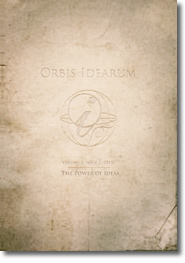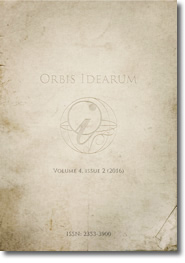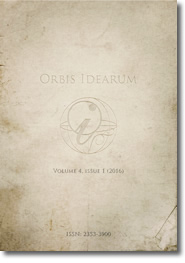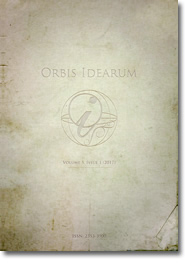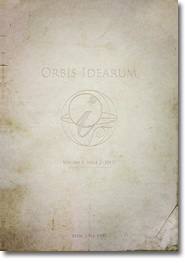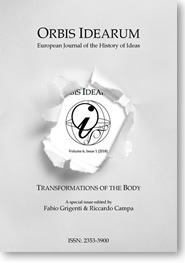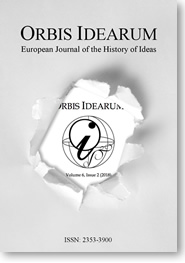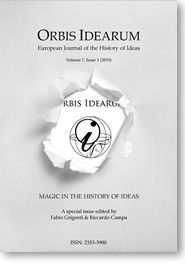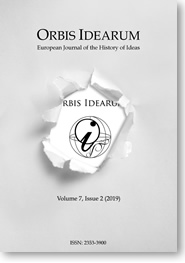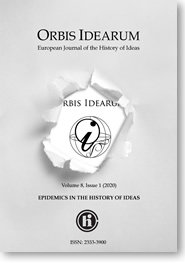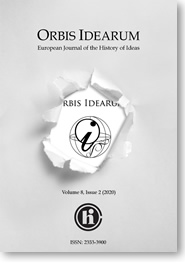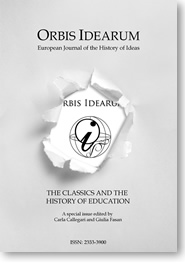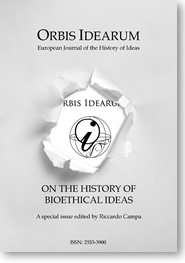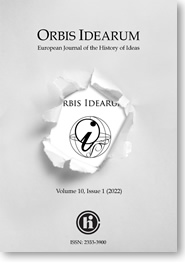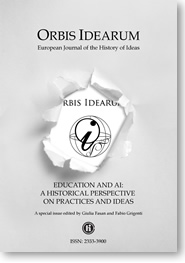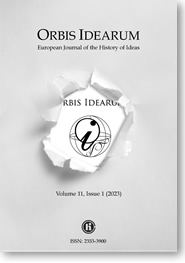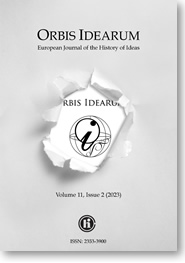Issues
Appearance, Reality, and Beyond
Volume 1, Issue 1 (2013)
In political and social philosophy, the philosophy of culture, and in the field of cognitive sciences—supported by the neurosciences, biology and psychology—the same metaphysical aim may today be observed, that is an aspiration to discover, still unattainable, the border between Appearance and Reality. In this context, how can we form various models of ethics, theories of laws or political systems if we are unable to give “clear and distinct” criteria of what is real, and thus what is true?
Michel Henri KowalewiczPreamble (en)
Gunter ScholtzReason as the Source of Appearance. Kant's Critique of Reason and Its Consequences (de)
Karl AchamOn the Appearance and Reality of the Ephemeral and the Significant. The Relevance of Old Differences in the Light of New Questions (de)
Hermann LangAppearance and Reality in Psychoanalysis (de)
Paweł DybelThe Body as a Mirror in Maurice Merleau-Ponty’s Philosophy of Painting (de)
Eric S. NelsonGenerativities: Western Philosophy, Chinese Painting, and the Yijing (en)
Helmut PulteScience and its Demarcation in the Light of the History of Ideas. A short Outline with apparent and real Implications for ‘Appearance and Reality’ (en)
Toleration and Tolerance
Volume 2, Issue 1 (2014)
Faced with increasing social, economic, and financial tensions, the International Day for Tolerance established by the United Nations is becoming––as never before––a challenge for the entire globalised world. The challenge is more significant as further values within the culture of the Western world are also at stake. These values, which remain at odds, are put to the test in an economic and political race against other cultural models, which do not share such values and that find the very notion of tolerance alien. We are deeply convinced that it is worth critically examining the history of the ideas, words and concepts surrounding the notion of tolerance, especially in our current time of rising intolerance not only in the Middle East, but also in other parts of the globe. At the same time there remains the age-old question of the limits of tolerance, what used to be called a denial of tolerance, or briefly “intolerance”. How far we have succeeded, you can judge for yourself.
Michel Henri KowalewiczPreamble (en)
Riccardo CampaThe Pagan Origins of the Idea of Religious Toleration in Enlightenment Literature (it)
Luciano PellicaniThe Cultural War between Athens and Jerusalem in American History (it)
Konrad SzocikThe Idea of Toleration in the Doctrine of the Catholic Church: A Brief Sketch (it)
The Idea of Power
Volume 3, Issue 1 (2015)
Probably the majority of our “modern” children intuitively associate the Power icon (⏻) with the possibility of either activation or deactivation of all kinds of devices: starting with the toaster or vacuum cleaner and ending with more complicated and perhaps more fascinating items, such as smart phones, tablets, computers or game consoles. From Antiquity to Modern Times, the historical dynamics of our changing understanding of the idea of power recalls a child’s discovering of the world, as both are based on new dealings and correlations.
Michel Henri KowalewiczPreamble. The Idea of Power (en)
Reason and Will. Remarks on Augustine’s Idea of Power (en)
Michel Henri KowalewiczIpsa scientia potentia est! Die Idee der universitas zwischen Vergangenheit und Zukunft [Ipsa scientia potentia est! The Idea of universitas Between Past and Future] (de)
The Power of Ideas
Volume 3, Issue 2 (2015)
In writing about freedom at the end of the 20th century, in his The Proper Study of Man (1998), Isaiah Berlin would refer to Heinrich Heine’s text entitled De l’Allemagne (literally “From Germany”). This book was written by Heine while he was a refugee in France. This title bears important resemblance to Madame de Staël’s book by the same title, De l’Allemagne, published in 1813. In this text, the writer philosopher Heine warns the French about the Power of Ideas (Macht der Ideen), with power (Macht) being understood also in the sense of violence (Gewalt). Heinrich Heine wrote about how, in the silence of the philosopher’s study, powerful ideas can be born; ideas that have the ability to destroy the whole of civilization. We nevertheless often forget the roots of this idea – an idea that has shaped our world to such a considerable degree. For this reason, it is to these roots that we dedicate the fourth edition of Orbis Idearum.
Michel Henri KowalewiczPreamble. The Power of Ideas (en)
Riccardo CampaA "History of Struggles" or a "Struggle of Histories"? : The Role of Ideas in Karl Marx's Historical Sociology (it)
Luciano PellicaniSymbolic Production and Power. Intellectuals as a Class (it)
Michel Henri KowalewiczHeroes and enemies. Weltanschauung as the main determining factor in the emergence of Central and Eastern European identities after the First World War (en)
Regular Issue
Volume 4, Issue 1 (2016)
“The show must go on.” That is what people say when an actor – however important he or she may be – leaves the stage. Similarly, the History of Ideas Research Centre and Orbis Idearum must go on. Nevertheless, we cannot hide our deep sadness at the untimely death of the founder of the Centre and its journal. Michel Henri Kowalewicz passed away on October 8th, 2016. We ask the reader to please forgive the unusually colloquial tone in which we are writing this Preamble; a style that is far from academic jargon and the cold precision which is typical of scientific publications. It seems to us that the moment calls for such a change of register. In the period between his diagnosis with cancer and his untimely death, we fortunately had many occasions to meet and talk with Michel. Despite the rapid progression of his illness, Michel remained strong to the very end. Whenever he had the strength to do so, not only did he continue his own work, but he also helped others with theirs. There was unfortunately not enough time to settle all of the questions related to the Centre and Orbis Idearum, but Michel made clear his desire that both be continued by his close collaborators and friends. In our attempt to fulfill his wish, we present you, the reader, with a new issue of Orbis Idearum – an issue that we sincerely dedicate “to the memory of Michel Henri Kowalewicz”.
Regular Issue
Volume 4, Issue 2 (2016)
“The show must go on.” That is what people say when an actor – however important he or she may be – leaves the stage. Similarly, the History of Ideas Research Centre and Orbis Idearum must go on. Nevertheless, we cannot hide our deep sadness at the untimely death of the founder of the Centre and its journal. Michel Henri Kowalewicz passed away on October 8th, 2016. We ask the reader to please forgive the unusually colloquial tone in which we are writing this Preamble; a style that is far from academic jargon and the cold precision which is typical of scientific publications. It seems to us that the moment calls for such a change of register. In the period between his diagnosis with cancer and his untimely death, we fortunately had many occasions to meet and talk with Michel. Despite the rapid progression of his illness, Michel remained strong to the very end. Whenever he had the strength to do so, not only did he continue his own work, but he also helped others with theirs. There was unfortunately not enough time to settle all of the questions related to the Centre and Orbis Idearum, but Michel made clear his desire that both be continued by his close collaborators and friends. In our attempt to fulfill his wish, we present you, the reader, with a new issue of Orbis Idearum – an issue that we sincerely dedicate “to the memory of Michel Henri Kowalewicz”.
Regular Issue
Volume 5, Issue 1 (2017)
Orbis Idearum, Volume 5, Issue 1 (2017) is a regular issue. As such, it has no topic, no title, no limitations to a particular theme. It is open to any contribution belonging to the history of ideas. The history of ideas is an academic specialty with its own object of study and its own methodology, and it is not to be confused with disciplines such as the history of philosophy, the history of science, the history of literature, the history of art, etc. The traditional work of the historian of ideas is the reconstruction of the path of an idea (typically, a word-and-concept), in a certain period of time, through different disciplines (philosophy, science, literature, art, etc.). That is why we often say that the history of ideas is an “inter-discipline.”
Regular Issue
Volume 5, Issue 2 (2017)
Orbis Idearum, Volume 5, Issue 2 (2017) is a regular issue. As such, it has no topic, no title, no limitations to a particular theme. It is open to any contribution belonging to the history of ideas. The history of ideas is an academic specialty with its own object of study and its own methodology, and it is not to be confused with disciplines such as the history of philosophy, the history of science, the history of literature, the history of art, etc. The traditional work of the historian of ideas is the reconstruction of the path of an idea (typically, a word-and-concept), in a certain period of time, through different disciplines (philosophy, science, literature, art, etc.). That is why we often say that the history of ideas is an “inter-discipline.”
Stefan Lorenz SorgnerReflexions concerning Ancient and Modern Philosophy of Music (en)
Roberto PauraFrom the Holographic Principle to the Simulation Argument: Metamorphosis of an Idea at the Edge of the Scientific Thought (it)
Riccardo CampaTechnological Unemployment: The Forgotten Lesson of Karl Marx (it)
Transformations of the body
Volume 6, Issue 1 (2018)
On February 13th, 2018 a conference on the theme "Transformations of the body" took place at the Department of Philosophy, Sociology, Education and Applied Psychology (FISPPA) of the University of Padua. The conference was attended by scholars from four different universities, both Italian and foreign. Given the quality of the presentations, the idea was born to publish the Conference Proceedings in the form of a special issue of Orbis Idearum. The papers that have passed the selection, based as always on the double blind peer review, are now gathered in this large volume, which bears the same title as the conference. The contributions deal with issues spread over a very broad time span, ranging from prehistory to the present day. Some authors have partially deviated from the typically interpretive descriptive approach of the history of ideas, sometimes venturing into axio-normative discussions – a "slip" perhaps unavoidable, if we consider the great social importance of the theme. Editors and reviewers have agreed jointly to allow the broadening of the discourse outside the theoretical and methodological lines of the discipline, provided that it was grafted onto a robust historical reconstruction.
Fabio GrigentiSuperpower and Imitation. Body and Machine (en)
Marcello IencaAn evolutionary argument for the Extended Mind Hypothesis (en)
Riccardo CampaThe Religion of Perfect Bodies : Observations on the Aesthetic Dimension of Zoroastrianism (it)
Federico ZilioThe Brain in the Body-as-Machine. Mechanism and Dualism in Contemporary Naturalism (it)
Alberto GiacomelliFrom Cult to Care. The body in Nietzsche between Eugenics and Construction of the Self (it)
Lorenza Bottacin CantoniPitié pour la Viande! The Cult and Cure of the Battered Body (it)
Giovanni OstiA Body on Demand. Between Human Enhancement and Achievement (it)
Regular Issue
Volume 6, Issue 2 (2018)
Orbis Idearum, Volume 6, Issue 2 (2018) is a regular issue. As such, it has no topic, no title, no limitations to a particular theme. It is open to any contribution belonging to the history of ideas. The history of ideas is an academic specialty with its own object of study and its own methodology, and it is not to be confused with disciplines such as the history of philosophy, the history of science, the history of literature, the history of art, etc. The traditional work of the historian of ideas is the reconstruction of the path of an idea (typically, a word-and-concept), in a certain period of time, through different disciplines (philosophy, science, literature, art, etc.). That is why we often say that the history of ideas is an “inter-discipline.”
Roberto ManzoccoThe Concept of Emergence. A Brief History and a Philosophical Analysis of an Ontological Regulative Principle of Organization (en)
Mariolina GraziosiDialogue between Sociology and Philosophy. Ontological Trust, Search for Meanings, and Self-Reflection in an Era of Uncertainty (en)
Riccardo CampaTechnological Unemployment. A Brief History of An Idea (en)
Magic in the History of Ideas
Volume 7, Issue 1 (2019)
On February 14th, 2019, a conference on the theme “Magic in the History of Ideas” took place at the Department of Philosophy, Sociology, Education and Applied Psychology (FISPPA) of the University of Padua. The conference was attended by scholars from different universities, both Italian and foreign. Given the high quality of the presentations, the idea was born to publish the Conference Proceedings in the form of a special issue of Orbis Idearum. The concept of magic is most often considered a foil by scholars in the fields of philosophy and religious studies, or it is discussed as part of the investigation of “primitive” systems of belief and ritual. In this special issue, authors were invited to present Magic as a system of inquiry and explanation unto itself, connected to, but distinct from, both philosophy and religious studies. Historical analyses may help to understand systems of magic as both natural and rational outgrowths of a particular perspective on reality. The magical traditions of Paleolithic hunters and contemporary indigenous peoples, and those found within classical Greece and Rome, medieval Judaism, and the European Renaissance, can be investigated as important and more or less disciplined attempts to understand the structure of the cosmos and the place of humankind there-in. Far from representing irrational or superstitious systems of belief, key esoteric traditions have played a central role in the rise of the art in the Old Stone Age, and of philosophy and science in the ancient, and early modern periods.
Simone TurcoTheater, Democracy, and the Mysteries. Historical Perspectives on the Normalization of the Irrational (en)
Antimo CesaroThe Magical Power of Frederich II, Lord of the World and of the Elements. Ideology of Knowledge and Ideology of Power in the Frescoes in the Crypt of the Cathedral of Anagni (it)
Regular Issue
Volume 7, Issue 2 (2019)
Orbis Idearum, Volume 7, Issue 2 (2019) is a regular issue. As such, it has no topic, no title, no limitations to a particular theme. It is open to any contribution belonging to the history of ideas. The history of ideas is an academic specialty with its own object of study and its own methodology, and it is not to be confused with disciplines such as the history of philosophy, the history of science, the history of literature, the history of art, etc. The traditional work of the historian of ideas is the reconstruction of the path of an idea (typically, a word-and-concept), in a certain period of time, through different disciplines (philosophy, science, literature, art, etc.). That is why we often say that the history of ideas is an “inter-discipline.”
Expanding the History of Ideas into Prehistory through Cognitive Archaeology (en)
Maria FlisUtopian Thinking: A Discourse on the Culture of Leszek Kołakowski and Zygmunt Bauman (en)
Monika WrzoszczykThe Idea of Judicial Review in the United States of America. The Context of Creating and Early Judgments of the Supreme Court (en)
Gianfilippo GiustozziPierre Teilhard de Chardin. Christian Mysticism and the Creative Power of Technology (it)
Riccardo CampaThe Magical Origins of Science. A Look at the Sociological Tradition (it)
Konrad Szocik„Spinozasstreit” – Jakobi's Polemic with Lessing and Mendelssohn. The Clash of Irrational Religiosity with Rationalism and Historical Criticism (pl)
Marek DrwięgaThe Freudian Unconscious - A Limit-Experience for Phenomenogy. In the Wake of Paul Ricœur (fr)
Epidemics in the History of Ideas
Volume 8, Issue 1 (2020)
There is a general consensus that the history of ideas was not born just to satisfy the idle curiosity of researchers regarding ways of thinking and communicating in the past. The history of ideas was also born to respond to the challenges of the present and the future, to help us make use of the knowledge we have inherited - although too often forgotten - and that is preserved in paper and digital archives. The COVID-19 pandemic that is currently disrupting the lives of billions of people in all nations of Earth invites reflection on past epidemics and pandemics. How have the plagues that have periodically affected mankind been studied, understood, and combated? How have the human dramas of contagion been portrayed in medical and scientific literature, legal codes, sacred texts, political speeches, newspapers and magazines, novels and other literary works? How have such experiences influenced other aspects of our lives, and in what ways can these effects be traced over time? What are the differences and similarities between the reactions to past epidemics and the reactions we are observing today against the threat of the coronavirus? In the current issue authors propose studies and reflections on these difficult topics, and thereby illustrate how knowledge of the past is helpful not only today, but also for moving constructively into tomorrow.
Wrath, Mercy, Pestilence, and Plague. How the Wisdom of the Ancients Offers Courage in Pandemic (en)
Antonio MarturanoVirality: Notes on a Concept Crossing Disciplines (en)
Roberto PauraThe Hermeneutics of Epidemics in Christian Thought and the Idea of the Punishing God (it)
Riccardo CampaThe Cause of the Pestilence in Florence According to Serafino Razzi. Notes on the Manuscript “Life and Death of Fra Girolamo Savonarola” (it)
Paweł PrüferBook Review: L’arte di passeggiare e fare le rivoluzioni: Per una sociologia della flânerie (pl)
Regular Issue
Volume 8, Issue 2 (2020)
Orbis Idearum, Volume 8, Issue 2 (2020) is a regular issue. As such, it has no topic, no title, no limitations to a particular theme. It is open to any contribution belonging to the history of ideas. The history of ideas is an academic specialty with its own object of study and its own methodology, and it is not to be confused with disciplines such as the history of philosophy, the history of science, the history of literature, the history of art, etc. The traditional work of the historian of ideas is the reconstruction of the path of an idea (typically, a word-and-concept), in a certain period of time, through different disciplines (philosophy, science, literature, art, etc.). That is why we often say that the history of ideas is an “inter-discipline.”
Mario CastellanaTopological Reason and Surrounding Ideas in Gaston Bachelard and Kurt Gödel (en)
Gianfilippo GiustozziPierre Teilhard de Chardin (1949-1955). The Advent of the "Ultra-Human" and the Transition Toward the "New Anthropology" and "Neo-Christianity" (it)
Emanuele Raganato"The Devil in Music". The Symbol of "Evil" in the History of Western Music (it)
The Classics and the History of Education
Volume 9, Issue 1 (2021)
The “social” and “cultural” turns, as well as the “material turn”, have had a remarkable impact on the historiography of education, significantly changing its paradigm, method, sources and objects, often over-shadowing the traditional approach to the discipline that entails the exclusive study of the history of ideas and theories. In view of these radical changes of the last fifty years, we can now ask how the history of educational ideas might be rethought for nowadays, epistemologically and methodologically, both in research contexts and in university teaching courses. This rethinking of the traditional objects of historical research in education will inevitably also involve the Classics. Appropriately contextualized in their time, the Classics have always provided an opportunity for scholars to study a specific cultural period, to retrace the development of the history of education through ideas, theories, doctrines, and even educational practices. (from the Preamble)
Furio PesciTeaching Ideas Through the Classics (en)
Carla CallegariClassics of the History of Education.
Educating for Peace and a Pedagogy of Hope (en)
Gabriella SevesoThe History of Pedagogy for the Professions of Today. For an Antidogmatic and Dialogical Use of the Classics (it)
Riccardo CampaSelf-Perfection and Mechanization.
Lessons from the Sociology of Education (it)
Lech WitkowskiExplosive Ideas for Pedagogy and Education,
and the Processes of Spiritual Development (pl)
On the History of Bioethical Ideas
Volume 9, Issue 2 (2021)
Bioethics is a rather young interdisciplinary field of inquiry. As an academic specialty, it emerged in the second half of the twentieth century as a consequence of new discoveries and inventions in the biomedical field. Despite its youth, bioethics already has a rich history due to the intensity with which its typical topics have been discussed. For example, topics such as organ transplant, euthanasia, abortion, in vitro fertilization, human experimentation, stem-cell therapies, gene therapies, and vaccines have indeed sparked debate both inside and outside the academic world. It is even truer that bioethics has a rich history if we consider the debates that took place before the word “bioethics” was introduced. Even if the prevailing temptation is to discuss the above-mentioned issues from a normative point of view, in this special issue of Orbis Idearum, specialists of the history of ideas have mainly contributed to the debate from their own, strictly historical, perspective.
James HughesArtificial Wombs: A Short History (en)
Sebastiano SerafiniConciliar Personalism and Anthropology of Humanae Vitae. Two Rival Paradigms at the Origins of Catholic Bioethics (it)
Gianfilippo GiustozziElio Sgreccia (1975-1986). At the Origins of his Bioethical Discourse (it)
Riccardo CampaMedical Ethics and Human Vivisection. Cases and Debates from Antiquity to the Industrial Revolution (it)
Riccardo CampaMedical Ethics and Abuses in Clinical Research. Cases and Debates from the Early 20th Century to the Birth of Bioethics (it)
Dawid Kamil WieczorekThe Analysis of Euthanasia in the Work of Karol Gutmann (pl)
Regular Issue
Volume 10, Issue 1 (2022)
Orbis Idearum, Volume 10, Issue 1 (2022) is a regular issue. As such, it has no topic, no title, no limitations to a particular theme. It is open to any contribution belonging to the history of ideas. The history of ideas is an academic specialty with its own object of study and its own methodology, and it is not to be confused with disciplines such as the history of philosophy, the history of science, the history of literature, the history of art, etc. The traditional work of the historian of ideas is the reconstruction of the path of an idea (typically, a word-and-concept), in a certain period of time, through different disciplines (philosophy, science, literature, art, etc.). That is why we often say that the history of ideas is an “inter-discipline.”
Education and AI: A Historical Perspective on Practices and Ideas
Volume 10, Issue 2 (2022)
Artificial Intelligence (AI) has the potential to address some of today’s biggest educational and training challenges, to innovate teaching and learning practices, and to accelerate progress towards quality, inclusive, equitable, and lifelong education (4th Goal of Sustainable Development of UNESCO, 2015). However, both AI and its presence in the educational system and in societies already have a history, and numerous authors of the past – pedagogues, sociologists, philosophers and intellectuals belonging to different fields of knowledge – have questioned the opportunities, risks, and challenges generated by rapid technological developments. The articles included in this issue first investigate the history and, secondly, the implications of the use of AI in education, in relation to the future of the labor market and the development of skills in training courses.
Giulia FasanEducation and the Future. Relations Between New Technologies and the World of Teaching in Twenty Years of the Scuola Italiana Moderna Journal (en)
Carla CallegariTechnologies, Education and Teaching Methodologies in Italian Schools in the 1980s. The Contribution of the Scuola Italiana Moderna Journal (en)
Riccardo CampaEducating Against the Automated World.
Alexis Carrel’s and Aldous Huxley’s Pedagogical Recipes (it)
Riccardo CampaEducating for the Automated World.
John Dewey’s and Mortimer Adler’s Pedagogical Recipes (it)
Alessandra PassarettiBook Review:
Educare nei mutamenti by Maria Luisa Iavarone (en)
Regular Issue
Volume 11, Issue 1 (2023)
Orbis Idearum, Volume 11, Issue 1 (2023) is a regular issue. As such, it has no topic, no title, no limitations to a particular theme. It is open to any contribution belonging to the history of ideas. The history of ideas is an academic specialty with its own object of study and its own methodology, and it is not to be confused with disciplines such as the history of philosophy, the history of science, the history of literature, the history of art, etc. The traditional work of the historian of ideas is the reconstruction of the path of an idea (typically, a word-and-concept), in a certain period of time, through different disciplines (philosophy, science, literature, art, etc.). That is why we often say that the history of ideas is an “inter-discipline.”
Mario Leonardo MiceliCentralization of Power in Leveller Political Literature: A Government that Secures Individual Rights or the Projection of an Unrestrained Power? (en)
Fabio BoniSpells in the Kabbalah Book of Queen Sobieska (it)
Gianfilippo GiustozziKarl Rahner (1966): Experiment Mensch. The Unfulfilled Dawn of a Christian "Antropotechnics" (it)
Federico MonaroPathological Existence and Freedom of Technology. The Drama of Freedom in Günther Anders’ Writings (it)
Riccardo CampaMusic and Politics. Reflections on a Fruitful Relation Turned Into an Adulterine One (it)
Andrzej BorowskiBook Review: Księga Kabał Królowej Sobieskiej w opracowaniu Ewy Śnieżyńskiej-Stolot i Fabia Boniego (pl)
Regular Issue
Volume 11, Issue 2 (2023)
Orbis Idearum, Volume 11, Issue 2 (2023) is a regular issue. As such, it has no topic, no title, no limitations to a particular theme. It is open to any contribution belonging to the history of ideas. The history of ideas is an academic specialty with its own object of study and its own methodology, and it is not to be confused with disciplines such as the history of philosophy, the history of science, the history of literature, the history of art, etc. The traditional work of the historian of ideas is the reconstruction of the path of an idea (typically, a word-and-concept), in a certain period of time, through different disciplines (philosophy, science, literature, art, etc.). That is why we often say that the history of ideas is an “inter-discipline.”
Riccardo CampaGod and His Biblical Alter Ego: On Two Types of Monotheism and Their Relation to War and Peace (en)
Thomas BeavittVasiliev’s ‘Consciousness and Things’: A Project for a Phenomenological Ontology (en)
Maxim PopovAuthoritarian Liberalism as a Political Concept: the Evolution of Ordoliberal Ideas in the European Integration Process (en)
Queen SarkarBeyond Truth and Fiction: an Exploration of the Arbitrary and Inconsistent Construction of Self in J. D. Salinger’s The Catcher in the Rye (en)
Gianfilippo Giustozzi"A God for a World About to Begin." The Theological "Singularity" of Pierre Teilhard De Chardin (it)
Marcin KrasnodębskiTechnocriticism and Religion: Christianity, Ecology and Techno-Scientific Progress in the Second Half of the 20th Century (pl)
Dawid Kamil WieczorekSynthetic Madness: From the Newest History of a Drug Problem (pl)
Regular Issue
Volume 12, Issue 1 (2024)
Orbis Idearum, Volume 12, Issue 1 (2024) is a regular issue. As such, it has no topic, no title, no limitations to a particular theme. It is open to any contribution belonging to the history of ideas. The history of ideas is an academic specialty with its own object of study and its own methodology, and it is not to be confused with disciplines such as the history of philosophy, the history of science, the history of literature, the history of art, etc. The traditional work of the historian of ideas is the reconstruction of the path of an idea (typically, a word-and-concept), in a certain period of time, through different disciplines (philosophy, science, literature, art, etc.). That is why we often say that the history of ideas is an “inter-discipline.”
Regular Issue
Volume 12, Issue 2 (2024)
Orbis Idearum, Volume 12, Issue 2 (2024) is a regular issue. As such, it has no topic, no title, no limitations to a particular theme. It is open to any contribution belonging to the history of ideas. The history of ideas is an academic specialty with its own object of study and its own methodology, and it is not to be confused with disciplines such as the history of philosophy, the history of science, the history of literature, the history of art, etc. The traditional work of the historian of ideas is the reconstruction of the path of an idea (typically, a word-and-concept), in a certain period of time, through different disciplines (philosophy, science, literature, art, etc.). That is why we often say that the history of ideas is an “inter-discipline.”
Dawid Kamil WieczorekHonor Cultures: An Outline of the Idea
and its Relation to Violence and Crime (en)
Anastazja ZakusiłoTopic Modelling: A Quantitative Research Technique for the History of Ideas (en)
Roberto PauraStrange Ideas: Using the History of Ideas
for the Understanding
of Pseudoscience (en)
Federico MonaroAI, Robot, and Consciousness:
A Brief History in Cinema (en)
Riccardo CampaThe Idea of the Unknown God
in Ancient Egyptian Religion (en)
Gianfilippo Giustozzi«The God Who Changes».
The Contribution of Pierre Teilhard de Chardin
and Other Thinkers of the 20th and 21st Centuries
to the Debate on the Future of Religious Experience. (it)
Regular Issue
Volume 13, Issue 1 (2025)
Orbis Idearum, Volume 13, Issue 1 (2025) is a regular issue. As such, it has no topic, no title, no limitations to a particular theme. It is open to any contribution belonging to the history of ideas. The history of ideas is an academic specialty with its own object of study and its own methodology, and it is not to be confused with disciplines such as the history of philosophy, the history of science, the history of literature, the history of art, etc. The traditional work of the historian of ideas is the reconstruction of the path of an idea (typically, a word-and-concept), in a certain period of time, through different disciplines (philosophy, science, literature, art, etc.). That is why we often say that the history of ideas is an “inter-discipline.”
The Value of Tradition: A Conservative Perspective (en)
Barbara NowakPiotr Skarga’s Idea of Charity in the Work for the Poor of the Krakow Charitable Society in the 19th and Early 20th Centuries (Selected Contexts) (en)
Plant-Thinking in the Anthropocene: Meditation, Memory, and the History of Ecological Ideas (en)


